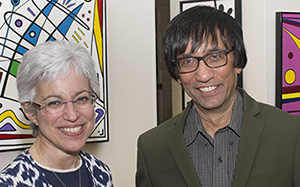
The School of Molecular and Cellular Biology is honored to announce that Professor Milan Bagchi, Department of Molecular and Integrative Physiology, has been named the Deborah Paul Professor of Molecular and Cellular Biology. An official investiture ceremony was held in the fall semester of 2016.
The position was made possible by a generous gift from the Deb and Tim Paul Endowment Fund. Deborah Paul, Ph.D. received her Masters in Biology from the University of Illinois in 1979 and then went on to have a distinguished career at Abbott Laboratories. There she is credited with pioneering work leading to the identification of HIV antigen in the serum of infected patients, enabling tests used in the diagnosis and monitoring of HIV infection.
As the 2016 MCB Convocation Speaker, Dr. Paul spoke of her late brother, Tim, as a major inspiration behind her research career. (See convocation speech.) Dr. Paul was also responsible for one of the initial uses of hybridoma technology (a method of producing large numbers of identical antibodies) at Abbott, providing the strategy, screening, purification and characterization of monoclonal antibodies to the hepatitis B surface antigen.
“I am privileged to be able to provide this gift to support the important work of Dr. Bagchi and to play a part in continuing the academic excellence at the University of Illinois while also benefiting the new College of Medicine,” said Dr. Paul.
Through her gift, Dr. Paul wishes to recognize an outstanding professor in the School of Molecular and Cellular Biology with demonstrated strengths in translational science, as well as linkages to the new College of Medicine.
“I am deeply touched by this honor, which recognizes the research efforts of my team to decipher the molecular genetic basis of steroid hormone action that controls cell proliferation, differentiation and immune response in female reproductive tissues,” said Dr. Bagchi. “Abnormal hormonal signaling is responsible for various human diseases ranging from reproductive dysfunctions and infertility to breast, ovarian and endometrial cancer. We are performing translational biomedical research in collaboration with clinical partners to improve our understanding of the underlying causes of these diseases. This generous gift will help us to continue to pursue these translational research goals.”
"In addition to Dr. Bagchi’s outstanding record of translational research, as department head, Dr. Bagchi has provided key guidance to the Department of Molecular and Integrative Physiology, recruiting physician-scientists and key faculty hires active in translational research," said Stephen G. Sligar, Director of the School of Molecular and Cellular Biology.
